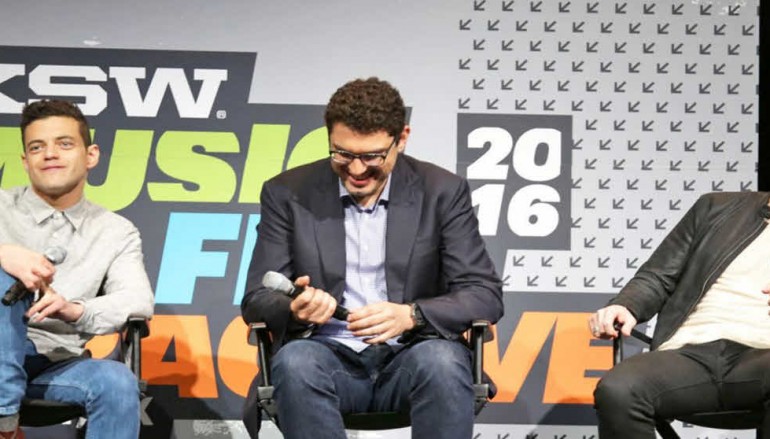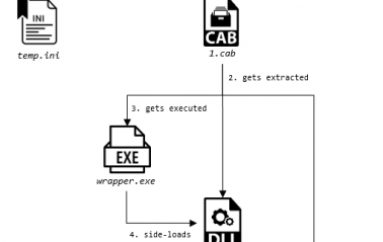A long line of people snakes through the halls until it winds down a flight of stairs. Over a thousand fans anxiously wait for the doors to open inside the Austin Convention Center. They’re here to see the creator and lead actors of Mr. Robot, the most compelling TV show about hackers in recent memory.

Mr. Robot has an FBI consultant to make hacking look authentic
A little later, the crowd now settled inside a massive ballroom roars as theMr. Robot trio — Sam Esmail, Rami Malek and Christian Slater — walked onto the stage at SXSW Interactive to talk about the authenticity of coding in the psychological thriller. Dozens of smartphone-wielding hands went up in the air to record the moment in synchronicity.
Mr. Robot has made nerd culture popular. What seemed like a niche show about computer geeks at the time went on to win Golden Globes and Critics Choice awards this year. When it first aired on USA Network last summer, it predictably drew in a thriller-loving audience while the poignant portrayal of a deeply troubled hacker named Elliot Alderson captivated more code-illiterate viewers. But, above all, Mr. Robotconnected widely with coders and hackers who finally found accurate representation of their skills.
That connection is one of the main drivers of the show. “I grew up a nerd,” says Mr. Robot creator Sam Esmail on stage at SXSW. “A lot of my friends are nerds and coders in InfoSec. Some of them are hackers. I made a poor attempt at hacking in college and was on academic probation. I wanted to tell a story about that culture because I found those people very interesting. I was watching all this cheesy crap — TV shows and movies — some of it I adore but they’re not great at representing who those people are and what that world looks like and what hacking really is.”
Mr. Robot tackles the world of hacking in a way that hasn’t been done in mainstream culture before. The show uses real codes that have gone through a rigorous vetting process. Esmail works with tech experts including people from InfoSec; a cyber security expert (who was recently promoted to being a writer on the show); and an FBI crime unit consultant to get the computer language right. They help ensure that the plots are grounded firmly in reality.
“We go heavy on the tech details,” Esmail says. “My production designer hates me because we create all these screens and at the end of the day we only see a few seconds of it.” He believes doing intensive groundwork adds to its credibility. Once the codes are worked out, what makes those lines look believable is the absence of a green screen that is often slapped on later for a pseudo complex code to flash on the screen. So the actor pretends to furiously type lines of code while shooting a scene. “They’re not seeing what they’re typing which actually throws me off,” he says. “On top of that there’s some bullshit on the screen which doesn’t make sense anyway. It was really important to us to add credibility.”

Rami Malek, who plays the show’s protagonist Elliot, types in the parts of the actual codes on the screen as the camera rolls. It’s a choice that lends to the believability of his character, which steers clear of the clichés. “A ‘nerd’ is an outcast and is bullied — that’s not true to life,” Esmail says. “There’s something there that people are missing. [Rami and I] talk about the darkness of it. Part of the reason Elliot is on the computer all the time is that he’s lonely. It’s not because people don’t won’t to talk to him … There’s something about him and his insecurities.”
It’s those vulnerabilities that make Elliot relatable. “I was drawn to this incredibly complicated character, a guy that was suffering and struggling to survive in his own skin,” Malek says. “We’ve shot some scenes in the pilot, where I remember [Elliot] staring at Angela’s [his childhood friend on the show] Facebook account and wishing he had that life. It really got me sad … We can all relate to being distanced by technology and the manicured Facebook pages that we create. I think people have found his honesty very endearing.”
Through the first season, the show exposes Elliot’s inner demons while tackling the larger hacking issues that have made headlines over the past few years. For the second season that’s currently being shot in New York, Esmail says the theme will be encryption and privacy. “Elliot committed a crime in the first season,” he says. “We’re going to see the ramifications of that in the second season.”
“The problem is that people don’t understand the nuances of that debate between Apple and FBI.”
Dealing with “rights to privacy” feels like a natural progression for the show. It also mirrors current events like Apple’s feud with the FBI, a parallel that Esmail discusses candidly. “Privacy is going to be a huge issue in the next decade,” he says. “The problem is that people don’t understand the nuances of that debate between Apple and FBI. We talked to our FBI consultants about this and they have a very strong point of view that encryption should allow for this sort of third-party side door thing, which I’m opposed to. I’m on Tim Cook’s side.”
When asked if the encryption theme is an intentional commentary on Apple’s case, Esmail says the idea was baked into the show before the incident. But he hopes that the theme will contribute to the debate and could potentially help people see both sides of it. It’s that kind of handling of sensitive but significant topics that has led to the popularity of Mr. Robot. “I love that all my nerds out there are getting into it,” Esmail says. “I love that they appreciate the authenticity of tech. Those are the people that I grew up with. So that means more to me than anything else.”
Source | Engadget





